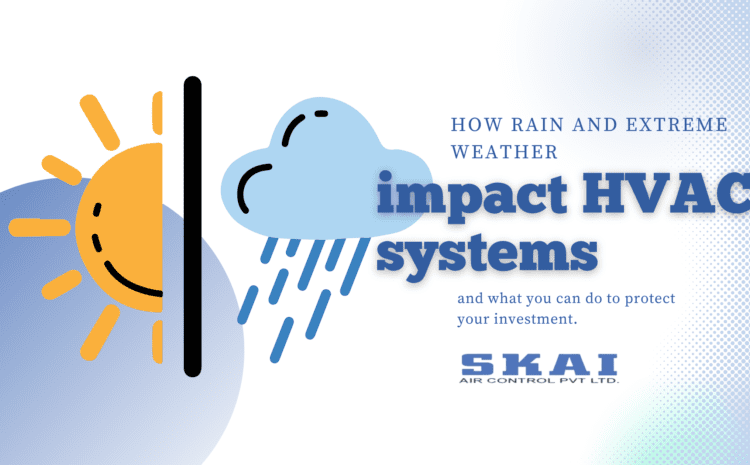
How Rain and Extreme Weather Affect HVAC Systems
In recent times, India has experienced a range of weather conditions, from heavy rains to extreme heatwaves. Understanding how these conditions affect HVAC systems is crucial for maintaining indoor comfort and efficiency. HVAC systems, essential for homes and businesses, consist of an indoor air handler/evaporator and an outdoor condenser/compressor unit. While these systems are designed to endure various weather conditions, specific challenges arise with extreme weather. Here’s how rain and extreme weather impact HVAC systems and what you can do to protect your investment.
Rain and Your Outdoor HVAC Unit
The outdoor component of your HVAC system is built to withstand rain and other elements. Key parts, such as those made from aluminum, copper, and metal, are designed to be weather-resistant. Electrical components are sealed to prevent water damage, making it safe to operate your air conditioner or furnace during rain. However, heavy rains can delay service appointments, especially if the unit is on the roof.
Potential Damage from Storms
Although rain itself is not harmful to HVAC units, storms that bring high winds and lightning can cause significant damage. High winds can blow debris into the unit, damaging the condenser grill and internal components. Lightning strikes can cause power surges, potentially damaging the compressor. During severe storms, it’s advisable to turn off your AC unit at the breaker to protect it from power surges.
Roof Leaks and HVAC Ductwork
Heavy rainfall can lead to roof leaks, which might go unnoticed and infiltrate HVAC ductwork. Ductwork isn’t waterproof, and water accumulation can cause deterioration and mold growth. This not only damages the ducts but also affects attic insulation, leading to increased energy consumption as the system works harder to maintain indoor temperatures. Regular roof and duct inspections can help mitigate these issues.
Covering the Outdoor Unit
Generally, covering the outdoor unit is not recommended. While it might seem like a good idea to protect the unit from rain, covering it can trap moisture, leading to corrosion and other damage. Proper airflow is essential for efficient operation, and any obstruction can impair performance. It’s best to leave the unit uncovered to ensure it operates optimally.
Servicing HVAC Systems in the Rain
HVAC technicians typically avoid servicing outdoor units during severe weather for safety reasons, especially if the unit is roof-mounted. Always check with your service provider to confirm appointments during inclement weather.
Climate Change and HVAC Systems in India

Climate change is leading to more frequent and intense weather events globally, including in India. Heatwaves, heavy monsoons, and unpredictable weather patterns are becoming more common, significantly affecting HVAC systems.
Heatwaves and HVAC Stress
Increased temperatures result in higher workloads for HVAC systems as they strive to maintain indoor comfort. This leads to longer operating hours, increased energy consumption, and higher utility bills. Regular maintenance is crucial to manage the added strain and prevent malfunctions.
Increased Demand for HVAC Technicians
With the rise in extreme weather events, the demand for skilled HVAC technicians is growing. Technicians are vital for maintaining, repairing, and optimizing HVAC systems to handle the additional stress from extreme weather. Regular maintenance checks can help ensure that systems are running efficiently and reduce the likelihood of breakdowns during peak usage.
Protecting Your HVAC System
Different weather conditions have unique impacts on HVAC systems. Here’s a summary of how various conditions affect your HVAC system and steps you can take to protect it:
- Heavy Storms and Winds: Can cause physical damage and clog systems with debris. Ensure that the area around the unit is clear of loose objects and trim nearby trees.
- Heavy Rainfalls: Can shift outdoor AC pads and cause water damage to internal components. Ensure proper drainage and remove debris promptly.
- Extreme Temperatures: Cause HVAC systems to overwork. Avoid running the system continuously during extreme heat and consider investing in a high-efficiency unit.
- Snow and Ice: Can cause components to bend and block airflow. Regularly clear snow and ice from the unit to maintain proper operation.
Conclusion
Regular maintenance and professional inspections are essential to ensure that HVAC systems can withstand and operate efficiently during extreme weather conditions.
For residents in India, understanding these impacts and taking proactive measures can help maintain the longevity and efficiency of HVAC systems. If you need service or have questions about your HVAC system, contact Skai Air. Our expert technicians are here to help you with all your HVAC needs. Call us at +91-99241 41181 to 85 or visit our website www.skaiair.com to learn more about our services.
